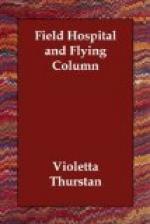Soon a young priest got up into the pulpit and gave them a little sermon. It was in Polish, but though I could not understand the words, I could tell from the people’s faces what it was about. When he spoke of the horrors of war, the losses and the deaths and the suffering that had come to so many of them, one woman put her apron to her face and sobbed aloud in the tense silence. And in a moment the whole congregation began sobbing and moaning and swaying themselves to and fro. The young priest stopped and left them alone a moment or two, and then began to speak in a low persuasive voice. I do not know what he said, but he gradually soothed them and made them happy. And then the organ began pealing out triumphantly, and while the guns crashed and thundered outside, the choir within sang of peace and goodwill to all men.
Christmas Day was a very mournful one for us, as we heard of the loss of our new and best automobile, which had just been given as a present to the Column. One of the boys was taking it to Warsaw from Skiernevice with some wounded officers, and it had broken down just outside the village. The mud was awful, and with the very greatest difficulty they managed to get it towed as far as Rawa, but had to finally abandon it to the Germans, though fortunately they got off safely themselves. It was a great blow to the Column, as it was impossible to replace it, these big ambulance cars costing something like 8000 roubles.
So our Christmas dinner eaten at our usual dirty little restaurant could not be called a success.
Food was very scarce at that time in Zyradow; there was hardly any meat or sugar, and no milk or eggs or white bread. One of us had brought a cake for Christmas from Warsaw weeks before, and it was partaken of on this melancholy occasion without enthusiasm. Even the punch made out of a teaspoonful of brandy from the bottom of Princess’s flask mixed with about a pint of water and two lumps of sugar failed to move us to any hilarity. Our menu did not vary in any particular from that usually provided at the restaurant, though we did feel we might have had a clean cloth for once.
MENU
CHRISTMAS 1914
Gravy Soup.
Roast Horse. Boiled Potatoes.
Currant Cake.
Tea. Punch.
We were very glad to go up to Radzivilow once more. Our former dressing-station had been abandoned as too dangerous for staff and patients, and the dressing- and operating-room was now in a train about five versts down the line from Radzivilow station. Our train was a permanency on the line, and we lived and worked in it, while twice a day an ambulance train came up, our wounded were transferred to it and taken away, and we filled up once more. We found things fairly quiet this time when we went up. The Germans had been making some very fierce attacks, trying to cross the river Rawka, and therefore their losses must have been very heavy, but the Russians were merely holding their ground, and so there were comparatively few wounded on our side. This time we were able to divide up into shifts for the work—a luxury we were very seldom able to indulge in.




